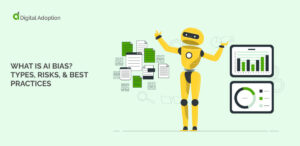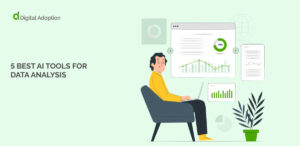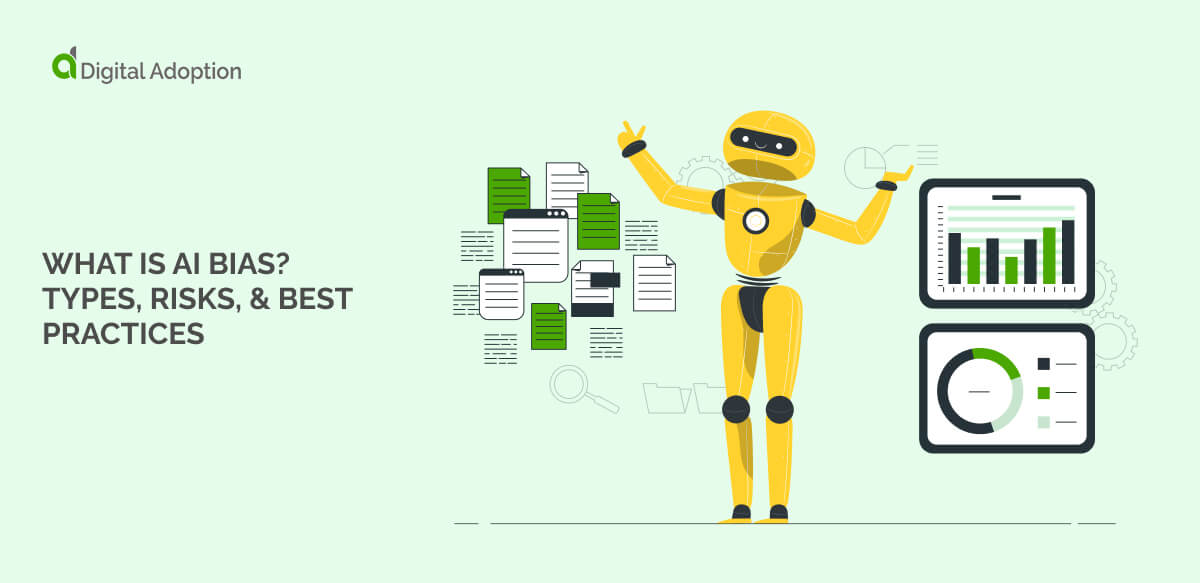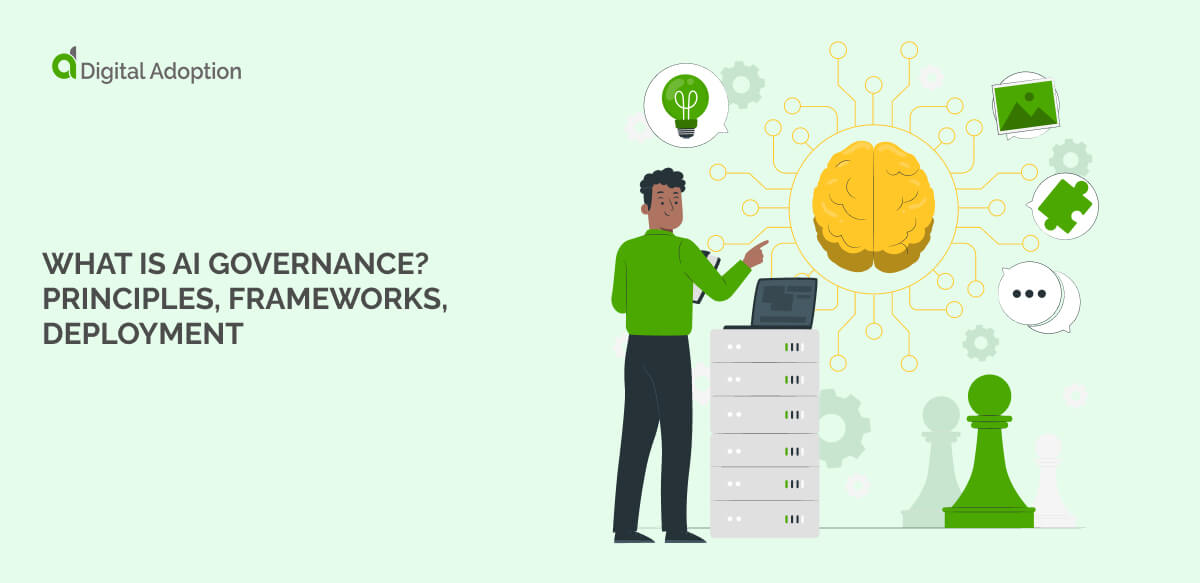Did you know there have been three industrial revolutions?
The first industrial revolution was impressive. Manufacturing was transformed by chemical and iron production processes invented in Great Britain.
The second industrial revolution came soon afterwards.
While the first grew industries such as coal, iron, and textiles, the second saw the expansion of electricity, petroleum, and steel.
Without these advancements, the third industrial revolution could not have begun. This one is also called the digital revolution. And a tool that is used globally to track its progress is the Digital Adoption Index (DAI).
What is the Digital Adoption Index?
The Digital Adoption Index is “a worldwide index that measures countries’ digital adoption across three dimensions of the economy: people, government, and business.” (source: The World Bank)
According to The World Bank, the Digital Adoption Index (DAI) is a simple average of three sub-indexes.
-
- Increasing productivity and accelerating broad-based growth for business
- Expanding opportunities and improving welfare for people
- Increasing the efficiency and accountability of service delivery for government
The DAI was conceived by The World Bank economists in collaboration with Microsoft. It was in response to incomplete existing indices. Previously, data had been based on household usage and/or perception surveys only.
DAI was constructed as part of the World Development Report 2016: Digital Dividends.
This report investigates the global accessibility of digital technologies. The spread is rapidly accelerating, even in developing countries.
For example, did you know that more households in developing countries own a mobile phone than have access to electricity or clean water?
DAI measures the depth and breadth of adoption of digital technologies in 171 countries. It spans every region and income group.
“By measuring the relative adoption of digital technologies, DAI can assist policymakers in designing a digital strategy with tailored policies to promote digital adoption across different user groups.”
How is the Digital Adoption Index applied?
DAI can capture new ideas and emerging trends. It can be a way to measure the worldwide adoption and use of digital technologies.
A straightforward application is to compare the level of digital adoption across countries. Then you can cross-reference that with the key agents of each national economy (see image below).
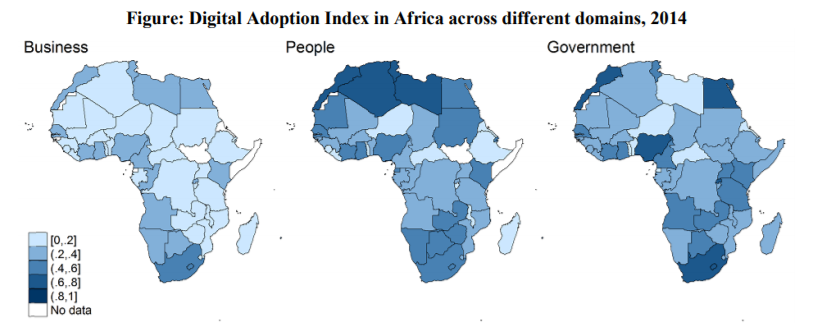 (source: World Development Report 2016, https://pubdocs.worldbank.org/en/587221475074960682/WDR16-BP-DAI-methodology.pdf)
(source: World Development Report 2016, https://pubdocs.worldbank.org/en/587221475074960682/WDR16-BP-DAI-methodology.pdf)
In many African countries, DAI shows that people are accessing digital tech reasonably well. However, adoption by businesses is unusually low. So policymakers should investigate barriers to business adoption.
Digital adoption index by industry
Digital adoption data is often broken down by industry. EY’s FinTech Adoption Index 2017, for example, explores its rapid emergence in the financial services space.
“We launched the first EY FinTech Adoption Index in 2015 to cut through the hype and understand whether digitally active consumers were actually using FinTech services on a regular basis.”
The most recent data shows that adoption of FinTech services is growing. Not only that but, as consumers adopt FinTech, they expect more from the industry.
“Consumers are drawn to FinTech services because propositions are simpler, more convenient, more transparent and more readily personalized.
“This has a ripple effect across the industry as consumers come to expect these characteristics in all financial products, regardless of whether in retail banking, wealth management or insurance, and of who is providing the service.”
The nimble, digital-first nature of start-ups means they have the advantage here. However, EY also notes that there are some opportunities for traditional financial services firms.
“In addition to potential joint ventures, acquisitions and investments into FinTech firms, incumbent financial services firms can learn from or acquire the services of FinTech firms to enhance existing offerings, provide new services, address common customer complaints, and even improve their own operational efficiency.”
A digital adoption index for SMEs
MTechHub has developed its own digital adoption index.
They claim to provide “the only benchmarking tool that measures digital transformation progress for SME manufacturing organizations.”
“The digital avalanche has overwhelmed SME’s and is, by and large, not actionable with limited resources.”
But the majority of SMEs understand that digital adoption must be priority for them within the next 5 years.
While just 13% of SMEs rate their digital adoption as advanced today, over 70% predict that it will be by 2022.
How a Digital Adoption Platform can help
For enterprises hoping to dominate in the digital space, a Digital Adoption Platform (DAP) can help.
Pioneered by WalkMe, the DAP is an AI tool that accelerates and improves digital adoption.
As with the first two industrial revolutions, being successful during this revolution isn’t just about learning a new way of doing things. According to WalkMe, it’s also about unlearning old habits and beliefs.
“While learning is gaining new knowledge, unlearning is the process of relinquishing mental constructs and ways of thinking that no longer serve you.”
People, countries, and businesses, are measured by the Digital Adoption Index. In all 3 groups, the leaders of this revolution are those who actively choose a digital-first mental paradigm.
Enterprises that use a DAP demonstrate their acceptance of contemporary beliefs about change management and adult learning. They’re also using a digital tool to solve a digital problem: how to fast-track their digital transformation.





